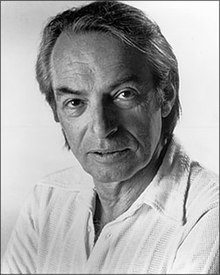|
Leonard Rosenman
Leonard Rosenman (September 7, 1924 – March 4, 2008) was an American film, television and concert composer with credits in over 130 works, including East of Eden, Rebel Without a Cause, Star Trek IV: The Voyage Home, Beneath the Planet of the Apes, Battle for the Planet of the Apes, Barry Lyndon, Race with the Devil, and the animated The Lord of the Rings.[1] Life and careerRosenman was born in Brooklyn, New York, United States.[1] His parents, Rose (née Kantor) and Julius Rosenman, were Jewish immigrants from Poland. He had a younger brother named Paul. After service in the Pacific with the United States Army Air Forces in World War II, Rosenman earned a bachelor's degree in music from the University of California, Berkeley. He also studied composition with Arnold Schoenberg, Roger Sessions and Luigi Dallapiccola.[2] Amongst Rosenman's earliest film work were the scores for James Dean movies East of Eden (1955) and Rebel Without a Cause (1955).[1] The composer had met Dean at a party for the cast of a Broadway play, and two weeks later Dean had appeared at his doorstep wanting to take piano lessons; consequently, the actor had begun to frequent Rosenman's apartment,[3] and it was Dean who introduced him to director Elia Kazan. Dean also lobbied George Stevens to let Rosenman score Giant, but Stevens preferred Dimitri Tiomkin.[4] Rosenman remarked, "The year I did my first film, I had five major performances in New York." But "the minute I did my first film, I didn't have a performance there for 20 years. They would never say, 'I don't like them'. They wouldn't look at them."[4] He composed the score for Vincente Minnelli's The Cobweb (1955), regarded as the first major Hollywood score to be written in the Twelve-tone technique. His avant-garde music was used for Martin Ritt's Edge of the City (1956) and John Frankenheimer's The Young Stranger (1957).[1] He composed scores for war films such as William Wellman's biographical Lafayette Escadrille (1958), Lewis Milestone's Pork Chop Hill (1959), Delbert Mann's The Outsider (1961), Don Siegel's Hell is for Heroes (1962), and the Combat! television series (1962). He wrote incidental music for such television series as Law of the Plainsman, The Defenders, The Twilight Zone, Gibbsville, and Marcus Welby, M.D..[1] He went on to compose George Cukor's The Chapman Report, then Richard Fleischer's Fantastic Voyage (1966), where he rejected producer Saul David's instructions. Rosenman stated, "A producer asked me to write a jazz score, and I asked him why. He said he wanted the picture to be the first hip science fiction movie. I said that's a great idea for an advertising agency, but it doesn't fit the film."[5] He provided scores to science fiction movies like Beneath the Planet of the Apes (1970), Battle for the Planet of the Apes, the horror movie Race with the Devil, the first animated adaptation of The Lord of the Rings (1978), and Star Trek IV: The Voyage Home (1986).[1] In the 1970s, he composed Bass Concerto Chamber Music 4 for bassist Buell Neidlinger and four string quartets with a second bass. In 1983, he composed the score for Cross Creek, for which he received an Academy Award nomination. In 1995, Nonesuch Records issued an album of music from both East of Eden and Rebel Without A Cause, played by the London Sinfonietta conducted by John Adams. In his seventies, Rosenman was diagnosed with Frontotemporal dementia, a degenerative brain condition with symptoms similar to Alzheimer's disease. He died March 4, 2008, of a heart attack at the Motion Picture & Television Country House and Hospital in Woodland Hills, Los Angeles, California.[6][7] AwardsLeonard Rosenman earned two Academy Awards:
After receiving his second Oscar he quipped, "I write original music too, you know!"[8] He received two additional Academy Award nominations:
He also received two Emmy Awards:
Filmography
References
External links
|
||||||||||||||||||
